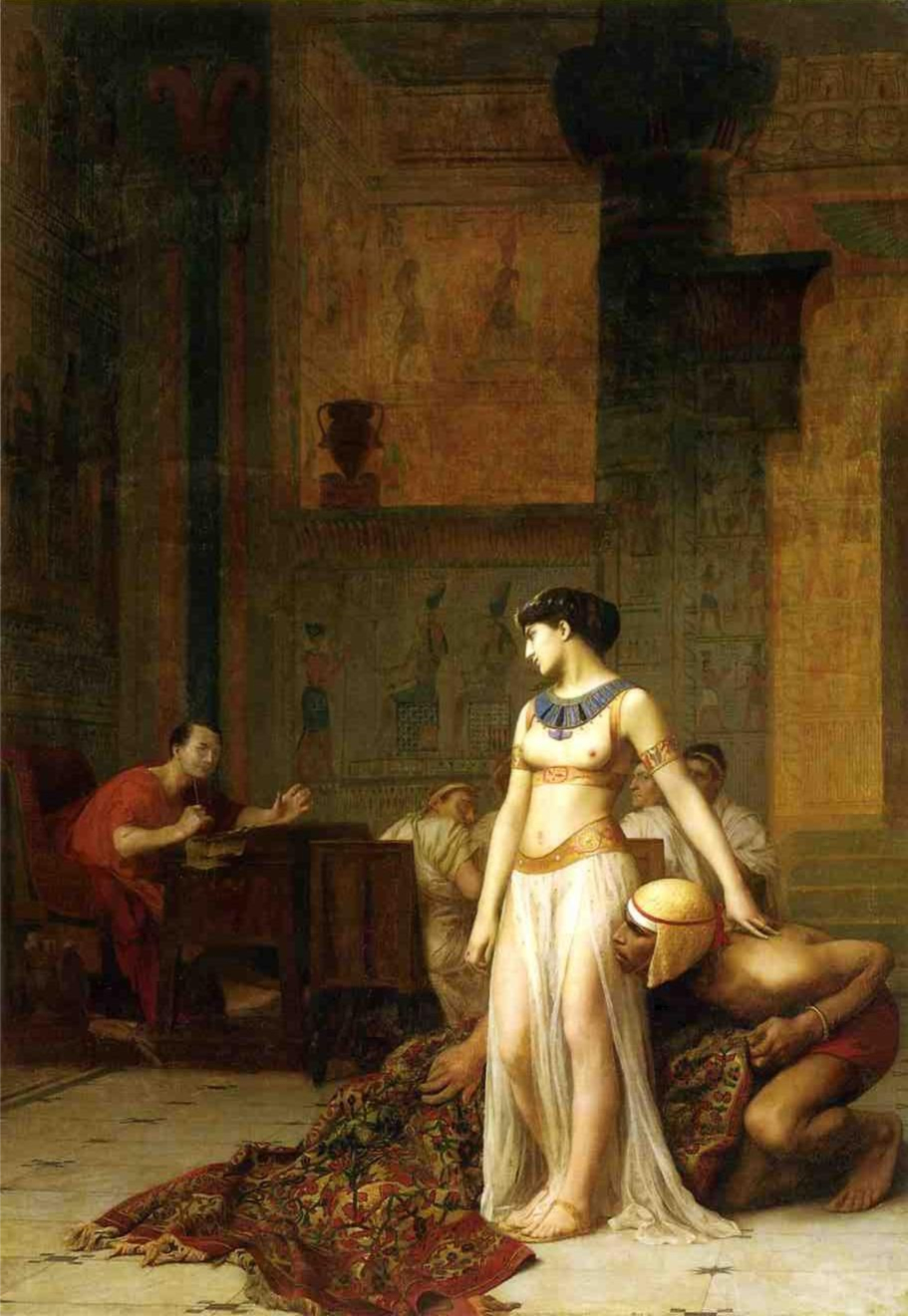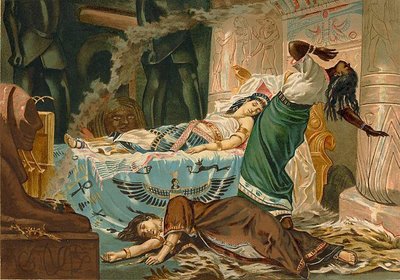 |
| I assume she looked better NOT as a statue. |
Anyways, like most leaders way back when, she came to power through lineage. Meritocracy wasn't really a thing back then. She came to power when she was only fourteen years old, the leadership falling to her and her younger, ten year old brother Ptolemy XIII through a number of deaths (assassinations, likely) that placed her as the next in line. At the time, Egyptian rulers were joint monarchs, one a man and one a woman, and the power was meant to be at least somewhat shared, although favouring the man.
 |
| Cleopatra, almost wearing a shirt. |
During her absence, the civil war between Julius Caesar and Pompey was reaching its end. Pompey, having his armies defeated and thus on the run from Caesar, travelled to Egypt basically to lay low for a while and possibly rebuild. Expecting to be welcomed with open arms, being a Roman and all, he was most likely somewhat surprised when Ptolemy III had his head lopped off in front of his wife and kids. Now, the relationship with Caesar and Pompey was rather complicated - yes they were at war, but Caesar was traditionally quite merciful, and did not wish Pompey any harm. He was furious at the assassination at his friend (in all fairness, I wouldn't have guessed that either if I was Ptolemy III) and demanded that the murderer find the same beheaded fate as his dear, warring friend. Tensions were high between Ptolemy III and Caesar.
 |
| The death of Cleopatra. Her servants, evidently, were shot. Dramatically. I believe this is the first painted case of overacting. |
Unfortunately for her, down went Caesar at the hands of Brutus and his crew way back in Rome. The result was a civil war (again) that led to the sides of Brutus and Mark Antony, with the backing of Octavian, the heir of Caesar, to war it out. Antony, stationing himself in Egypt, became quite taken with Cleopatra. She pledged loyalty to him, and gave birth to twins. This all occurred while Antony was married to Octavian's sister... whoops. Basically Cleopatra was in a lot of ways a home-wrecker. Naturally, this put a bit of stress on the relationship of Octavian and Antony, as cheating on one's sister is usually worthy of an argument or two - especially when he's so bloody brazen about it. Antony eventually married Cleopatra, and Octavian eventually went to war with Antony. Of course it was over a heck of a lot more than just Cleopatra, but she definitely played a part. Antony was eventually defeated, and knowing that, he committed suicide. Cleopatra followed suit, and the most likely manner in which she died was she allowed an asp to bite her. They're poisonous. I believe you most likely have figured that out.
Since, Cleopatra has been modernized as a slutty costume for Halloween. A wonderful legacy.
Famous Historical Figures Say the Darndest Things!
- "Her beauty, as we are told, was in itself not altogether incomparable, nor such as to strike those who saw her; but converse with her had an irresistible charm, and her presence, combined with the persuasiveness of her discourse and the character which was somehow diffused about her behaviour towards others, had something stimulating about it. There was sweetness also in the tones of her voice; and her tongue, like an instrument of many strings, she could readily turn to whatever language she pleased..." This is from Plutarch, a Greek historian. Uh... I guess he's saying she wasn't that hot, but had a charm about her.
- "Cleopatra's nose, had it been shorter, the whole face of the world would have been changed." The words of a French theologian, saying if her face was a different face the face of the world would be a different face.
- "All strange and terrible events are welcome; but comforts we despise, our size of sorrow; proportion'd to our cause, must be great." From the play Antony and Cleopatra. Even the great Egyptian leader is not immune to the boredoms of Shakespeare.
No comments:
Post a Comment